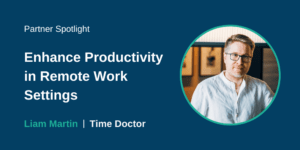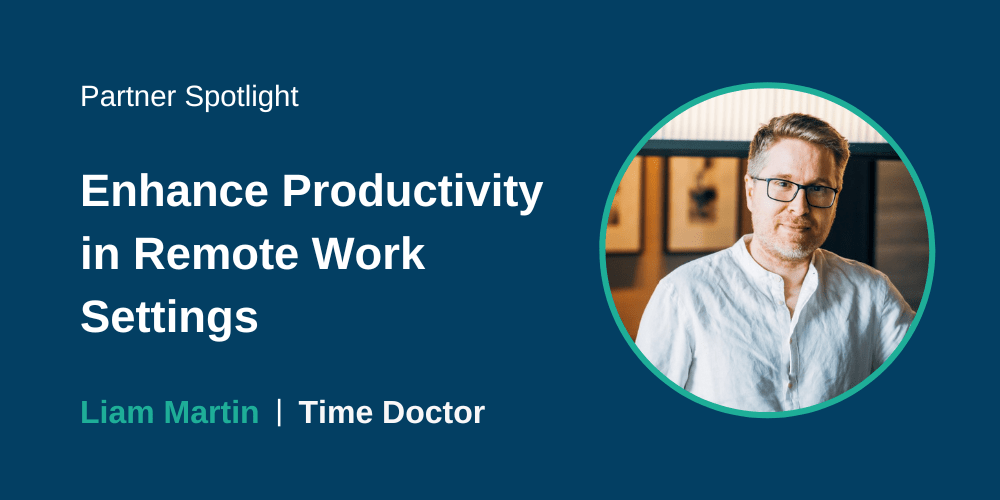Hey, thanks for tuning in to another Partner Spotlight interview at OutsourceSchool.
My name is Connor Gillivan. I’m the CMO and an Owner of Outsource School.
We’re on a mission to help 10,000+ business owners master hiring virtual assistants and freelancers, and industry partnerships is a big way that we’re able to make it happen.
We’re all about creating win-win partnerships where we are able to grow with other companies in the eCommerce, agency, SAAS, and online space.

In this exclusive interview, we interview Liam Martin from Time Doctor.
Liam Martin is the co-founder and CMO of Time Doctor and Staff.com — one of the most popular time tracking and productivity software platforms in use by top brands today. He is also a co-organizer of the Running Remote Conference.
We hope that you enjoy the interview and that it brings value to you as an agency business owner.
 Connor: Hey Liam, thanks for taking the time to chat with us here. We love getting to know our partners better so that our community can benefit from what our partners are offering and doing in the industry. To get started, can you give us a high level overview of Time Doctor and how it got started?
Connor: Hey Liam, thanks for taking the time to chat with us here. We love getting to know our partners better so that our community can benefit from what our partners are offering and doing in the industry. To get started, can you give us a high level overview of Time Doctor and how it got started?

Liam: Hi, it’s a pleasure to be here. At its core, Time Doctor is all about fostering productivity and efficiency in the remote work landscape. It’s a platform that allows companies and individuals to monitor and manage their time, creating a more focused, effective, and balanced work-from-home environment.
The genesis of Time Doctor was from personal experience. My co-founder and I were managing remote teams and encountered the challenges that came with it, such as tracking productivity and maintaining work-life balance. We realized that there were gaps in the market for effective tools that addressed these issues. So, we set out to build a solution that would not only help us but also assist countless other businesses navigating the remote work terrain.
From those early days, Time Doctor has grown into a comprehensive platform, committed to facilitating successful remote work experiences for teams around the world. Our primary goal is to keep enhancing the way people and organizations operate remotely, providing the tools for businesses to thrive in this new world of work.
 Connor: Love that! Can you dive a bit more into the employee-friendly time tracking products and services that you provide? I’m sure our audience would love to know exactly what problems you could solve for them.
Connor: Love that! Can you dive a bit more into the employee-friendly time tracking products and services that you provide? I’m sure our audience would love to know exactly what problems you could solve for them.

Liam: Surely! Time Doctor is designed with a respect for employee autonomy and privacy in mind. Our time-tracking platform allows employees control over when they’re tracked, and they can view their own data, which can help improve productivity patterns and work-life balance.
We offer features like website and application tracking, optional screenshots, and detailed reporting. This helps in identifying productivity bottlenecks, streamlining workflows, and ensuring team alignment.
Not only do we help improve productivity and accountability, but we also integrate with various project management tools for a more unified experience. Our main goal is to provide an employee-friendly platform that aids effective communication and productivity in remote work settings.
 Connor: Jumping off of that…if there was one problem you’d say that Time Doctor solves best for your clients, what would it be? Why?
Connor: Jumping off of that…if there was one problem you’d say that Time Doctor solves best for your clients, what would it be? Why?

Liam: I’d say the most critical problem Time Doctor solves is enhancing productivity in remote work settings. Remote work offers many benefits, but it also brings challenges such as distractions, inefficiencies, and lack of visibility.
Time Doctor addresses this by providing comprehensive insights into how work hours are spent, allowing both managers and employees to identify bottlenecks and areas for improvement. It encourages transparency and accountability, promoting a more efficient and focused workflow.
Moreover, it helps create a balance between ensuring productivity and maintaining employee autonomy, which is key to a healthy and successful remote work environment. In essence, Time Doctor facilitates a harmonious and productive remote work ecosystem, which is especially crucial in today’s digital age.
 Connor: As the company continues to grow over the next year, what are your plans for expansion? Any new products or offerings or enhancements to your current products?
Connor: As the company continues to grow over the next year, what are your plans for expansion? Any new products or offerings or enhancements to your current products?

Liam: Long term we see time as the least important part of Time Doctor ironically.
 Connor: And how specifically would you say that Time Doctor and your team is different from other similar businesses in the industry?
Connor: And how specifically would you say that Time Doctor and your team is different from other similar businesses in the industry?

Liam: We’re constantly focused on evolving with the needs of the remote work landscape, and our roadmap for the next year reflects this commitment.
One key area of focus is developing deeper integrations with widely-used productivity and project management tools. Our aim is to create an even more seamless experience for our users, where they can track time, manage tasks, and analyze productivity all within their favorite tools.
Furthermore, we’re looking into enhancements in our reporting and analytics. We’re working on incorporating more advanced data analysis, to offer our clients a greater degree of insight into their work patterns and productivity trends. This will enable more informed decision-making and proactive adjustments to enhance team efficiency.
We’re also excited to be developing features that focus on employee well-being, recognizing that a healthy work-life balance is crucial to long-term productivity. The idea is to provide employees with tools to better manage their workload, mitigate burnout, and maintain a healthy balance while working remotely.
Overall, our growth plan hinges on continually refining and expanding our offerings to meet the evolving needs of the remote work world, helping companies and their employees thrive in this environment.
 Connor: What’s your outsourcing story? We find that everyone has a different experience when outsourcing and hiring online. What is your first memory that comes to mind?
Connor: What’s your outsourcing story? We find that everyone has a different experience when outsourcing and hiring online. What is your first memory that comes to mind?

Liam: My first significant experience with outsourcing was when my co-founder and I were building our previous company. We had a small team and a lot of tasks that needed doing. To grow efficiently, we decided to outsource some of our work to talent across the globe.
The first memory that comes to mind was hiring a developer from the Philippines. We were impressed by the abundance of talent available and the potential for cost savings. However, as time passed, we noticed some tasks were taking longer than anticipated. There were issues of productivity and communication that we hadn’t considered thoroughly at the outset.
We realized that managing a remote team came with its unique set of challenges – you can’t walk over to someone’s desk to check in, and it’s harder to gauge how work is progressing. That’s when we recognized the need for a tool that could help manage and monitor remote work effectively, which eventually led us to create Time Doctor.
This journey was a learning curve for us. We made mistakes, we learned, and we used those lessons to build something that could solve the very problems we experienced. Our own challenges with outsourcing became the catalyst for a solution that now helps many other companies manage their remote teams efficiently.
 Connor: Love it! Talking more about outsourcing, what advice would you give to yourself if you were just about to start outsourcing and hiring online?
Connor: Love it! Talking more about outsourcing, what advice would you give to yourself if you were just about to start outsourcing and hiring online?

Liam: If I could go back and give myself advice at the start of our outsourcing journey, I would focus on these key points:
Clear Communication: Ensure you have clear and concise communication systems in place. Misunderstandings can lead to lost time and resources, so make sure your instructions are easy to understand and leave little room for interpretation.
Define Expectations: Clearly outline your expectations for each task or project. This includes deadlines, quality of work, and the communication you expect throughout the process.
Cultural Sensitivity: Be aware of cultural differences and time zones. It’s important to show respect for your team’s holidays, work hours, and cultural nuances.
Use the Right Tools: Invest in effective project management and time tracking tools. These will help you stay organized, keep track of progress, and ensure productivity.
Build Relationships: Treat your outsourced team members with the same respect and consideration as you would in-house employees. Build strong relationships based on mutual trust and respect.
Lastly: Check out www.runningremote.com and our book ‘Running Remote’ which goes over all these tips and more!
Outsourcing can be a powerful tool for business growth, but it requires a thoughtful approach and careful management to be truly effective.
 Connor: How about this one…how do you communicate with the people you hire online? What’s your best practices there and how has it changed over time?
Connor: How about this one…how do you communicate with the people you hire online? What’s your best practices there and how has it changed over time?

Liam: Communication with remote teams requires deliberate effort and strategy. Over time, we’ve developed a few best practices:
Regular Check-ins: We hold weekly check-ins to discuss tasks, progress, and any issues that may have arisen. This creates a consistent forum for open dialogue and ensures everyone is aligned and informed.
Asynchronous Communication: We appreciate that we’re working across different time zones, so we encourage asynchronous communication. This respects individual work rhythms and allows for thoughtful responses.
Effective Tools: We leverage tools like Slack for instant communication, email for non-urgent updates, and video conferencing tools for face-to-face interaction. Time Doctor comes in handy for managing work hours and productivity.
Clear Expectations: We aim to be clear about what, when, and how we communicate. Whether it’s which platform to use for what kind of updates or turnaround times for responses, setting these expectations helps streamline communication.
Building Relationships: We also focus on non-work interactions, hosting virtual team-building activities to build rapport and maintain a strong team culture.
Over time, we’ve learned that effective communication with remote teams isn’t just about staying updated on tasks—it’s about building relationships, fostering a shared culture, and maintaining the human element even when we’re working apart.
 Connor: Finally, this is one that I think our community will love, who’s been your best online hire? What do they do for you? Why are they your best hire? Tell us all about them and that story!
Connor: Finally, this is one that I think our community will love, who’s been your best online hire? What do they do for you? Why are they your best hire? Tell us all about them and that story!

Liam: Honestly, anybody who is a ‘self guided missile’ which is a core company value inside of our companies. Somebody who tells us what they did rather than asking us what to do is critical for success in our companies and the larger space of remote work in general.
 Connor: As we close this out, I just have one more question. Where is the best place to find and follow you and the company online? Also, if you have one, is there any special offer that you’ll be offering to the community today?
Connor: As we close this out, I just have one more question. Where is the best place to find and follow you and the company online? Also, if you have one, is there any special offer that you’ll be offering to the community today?

Liam: For anything Time Doctor related go to www.timedoctor.com. You can pick up a free trial there. For anything Running Remote related, go to www.runningremote.com I’m @liamremote on all forms of social media. Go to www.youtube.com/runningremote where all of our talks are up there for free if you’d like to check that out as well.


